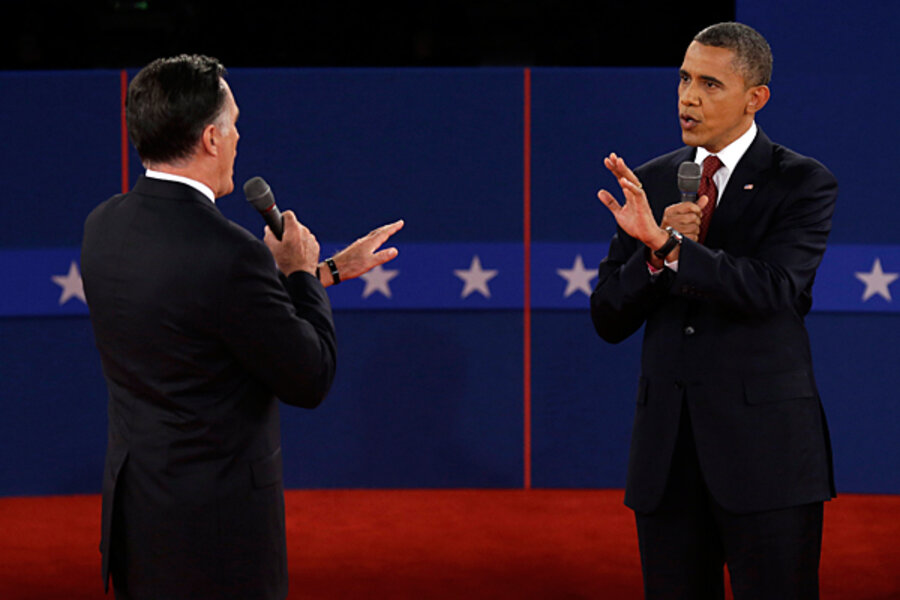Presidential debate 101: When did Obama label Libya attack 'terror'?
Loading...
When did President Obama label as “terror” the attack that killed the US ambassador to Libya? This issue has become one of the most contentious to arise out of Tuesday night’s presidential debate at Hofstra University. That’s because it involved a tough question, a heated response, a lunge counterattack, and then intervention by controlling authority. (It sounds Shakespearean when we summarize it that way, doesn’t it? As if it’s a lost scene from “Hamlet” or “King Lear.”)
This dramatic exchange began when moderator Candy Crowley asked Mr. Obama whether Secretary of State Hillary Rodham Clinton was responsible for any US failures that led to the assault in Benghazi, which killed Ambassador Christopher Stevens and three other Americans. Obama replied – as he had to in that circumstance – that as president the buck stops with him.
Then he added this: “The day after the attack ... I stood in the Rose Garden and I told the American people and the world that we were going to find out exactly what happened. That this was an act of terror, and I also said that we’re going to hunt down those who committed this crime.”
After a few more lines from Obama, Mitt Romney pounced. Pacing the stage like a big fish that thinks it’s spotted a tasty herring, the former Massachusetts governor repeated Obama’s assertion that he’d used the word “terror” in the Rose Garden.
“I want to make sure we get that for the record because it took the president 14 days before he called the attack in Benghazi an act of terror,” said Mr. Romney.
Snap. Just like that the herring turned into a lure, and Romney got caught.
“Get the transcript,” said Obama.
Moderator Crowley, who had access to the transcript in question, stammered out this: “He did in fact sir ... call it an act of terror.”
“Can you say it a little louder, Candy?” said Obama.
OK, that’s the set-up. Going back and looking at the transcript ourselves, Ms. Crowley was right. The day after the deadly assault the president stood outside at the White House and among other things said that “no acts of terror will ever shake the resolve of this great nation, alter that character, or eclipse the light of the values that we stand for.”
Plus, Obama repeated variations of this line at two fundraisers the next day. So, in a narrow sense, Romney was wrong. The word “terror” was part of Obama’s language about the attack from the first.
But in a larger sense Romney isn’t wrong. It took weeks for the administration to state clearly that the attack was a particular act of terrorism carried out by radical Islamists. Crowley made this point during the debate, too, but it got overshadowed by the reaction to Romney bungling the attack.
Crowley clarified this in interviews following the Hofstra rumble. For a long time, administration officials kept insisting that the attack was the outgrowth of protests about a US-made anti-Islamic video, she said on CNN afterward. References to “terror” were general, and details were vague.
Romney “was right in the main. I just think he picked the wrong word,” said Crowley.
For instance, during an appearance on ABC’s “The View” on Sept. 25, Obama himself declined an opportunity to label the assault as terrorism. He said instead that “there is no doubt that the kind of weapons that were used, the ongoing assault, that it wasn’t just a mob action.”
Evidence now points to an organized attack by heavily armed members of a local Islamic militia.
Finally, we’ll take this a step further: Is arguing over word choice missing the point? You call it “terror,” I call it “potato” – the real issue is why the US did not see the attack coming and move to prevent it. Was there intelligence chatter about a possible attack tied to the date Sept. 11? Why didn’t the ambassador have more security guards? What do we know about the motivations of the attackers? (According to New York Times interviews with locals, for instance, the militia in question was indeed outraged over the anti-Muslim video.)
That’s a larger and more important argument to get into. And what do you know – there’s another debate next week that focuses on foreign policy. We bet this subject comes up. Quickly.






